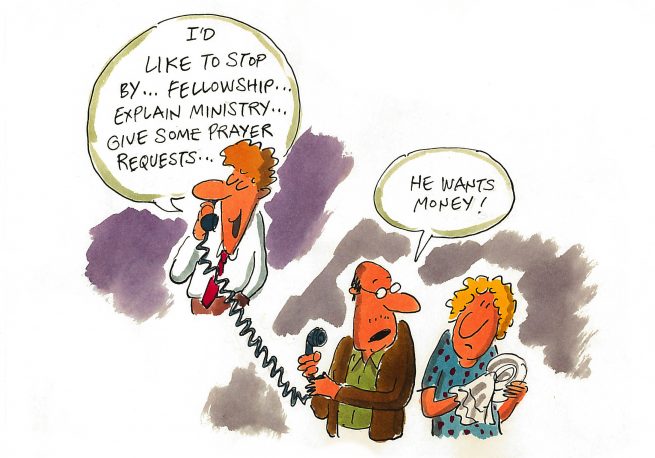Three Fundraising Culs-de-sac: Extremely logical half-truths that take you in circles

This article was originally published for Support Raising Solutions by Scott Morton.
Adapted from Scott’s book:
Blindspots: Leading Your Team and Ministry to Full Funding
Funding coaches and leaders need to be alert for three subtle fundraising “sayings.” These half-truths seem logical, but following them leads into a cul-de-sac.
Let’s dive in!

Cul-de-sac #1: “Money follows visibility.”
Years ago a well-known Evangelical conference and radio speaker lamented: “Our funding keeps going down even though I am speaking more and sending over 1,000 newsletters.”
But few people give merely because you are visible to the public eye. Your potential donors go to bed at night wondering about their text messages or how to get their teenage daughter to a nunnery. They are not thinking about your support!
They think about your support only when they are asked.
And the most effective ask is face to face.
The yes-rate for face-to-face appeals around the world is 50–70 percent (for those who have been trained in how to do it).
Cul-de-sac #2: “Money follows talking.”
A gospel worker had a dynamite discipling ministry among business guys, but he was chronically underfunded.
He said, “I talk about money all the time with these guys, but they never seem to give.”
Is talking about marriage with your fiance’ the same as actually asking her to marry you?
Sooner or later, a potential giving partner must be invited to make a stewardship decision—you must ask. Merely talking about money is not fundraising.
Cul-de-sac #3: “Money follows hinting.”
Some mission leaders hint about their funding.
“People catch on,” they say with a wink.
A prayer request at the bottom of your newsletter asking readers to pray about your support is not asking.
Hinting is most common when gospel workers can’t get up the nerve to ask face to face.
If they merely hint, they do not feel as rejected when donors ignore the hint. After all, they didn’t really ask.
Secondly, hinting could show that I don’t think the donor has the ability to handle a forthright invitation to join my vision.
But that is not likely true. It devalues him or her as a person.
In other areas of ministry we do not hint.
Do you hint when you ask someone to receive Christ?
Escape from the Culs-de-sac: “Money follows asking.”
The escape from all three culs-de-sac is “Money follows asking.”
But what if the person you are coaching feels asking is wrong?
Some background is helpful.
The accidental patron saint of the no-ask model is George Mueller of Bristol, England who “told only God.”
In the late 1800’s abundant funding flowed to Mueller’s orphanages year after year.
But do your staff know that Mueller sent thank-yous to his donors telling of the wonderful things God was doing?
Though he did not ask, he thanked donors and kept them informed.
I highly respect George Mueller because he reminds me to look to God.
Unfortunately, the evangelical public has elevated George Mueller’s no-ask practice into the spiritual way to fundraise.
Is it possible Mueller’s accidental popularity has done more harm than good?
My wife and I tried Mueller’s model and found it didn’t work.
Because we didn’t have enough faith?
Possibly, but more likely we needed to exercise even more faith by inviting others to join us one by one.
What does the Bible say about asking?
- Paul asked the Corinthians to support the church in Jerusalem (2 Corinthians 8:10–11).
- Paul asked to the Romans to help him minister in Spain (Romans 15:20–24).
- Jesus expected the 12 disciples to ask “worthy men” to host them (Matthew 10:11).
- King Joash asked his people to give for repairing the temple (2 Chronicles 24:9).
- Moses asked the children of Israel for 13 items to build the tabernacle (Exodus 25:1-9).
- Nehemiah asked Artaxerxes for timber to build Jerusalem’s walls (Nehemiah 2:8).
- Elijah asked a poor Sidonian widow for bread (1 Kings 17:11-12).
- Hezekiah commanded the Jews to restart tithing for the Levites (2 Chronicles 31:4).
Your staff might have high visibility, talk about money well, and even do holy hinting, but they are headed into a cul-de-sac that takes them in circles.
Honor potential partners by inviting them one-by-one to make serious stewardship decisions.
Takeaway
Ask your staff or those you are coaching:
- What are your fundraising tactics? Visibility? Talking about money? Hinting?
- Who are five people who need to hear your story face-to-face in the next month?
- What exact words will you use in making an appeal for your ministry?
For 3-minute videos and tools to help those you coach or lead visit www.scottmorton.net
This article is submitted by Jessica Wood of Support Raising Solutions. Support Raising Solutions is a Missio Nexus member. Member organizations can provide content to the Missio Nexus website. See how by clicking here.





Responses